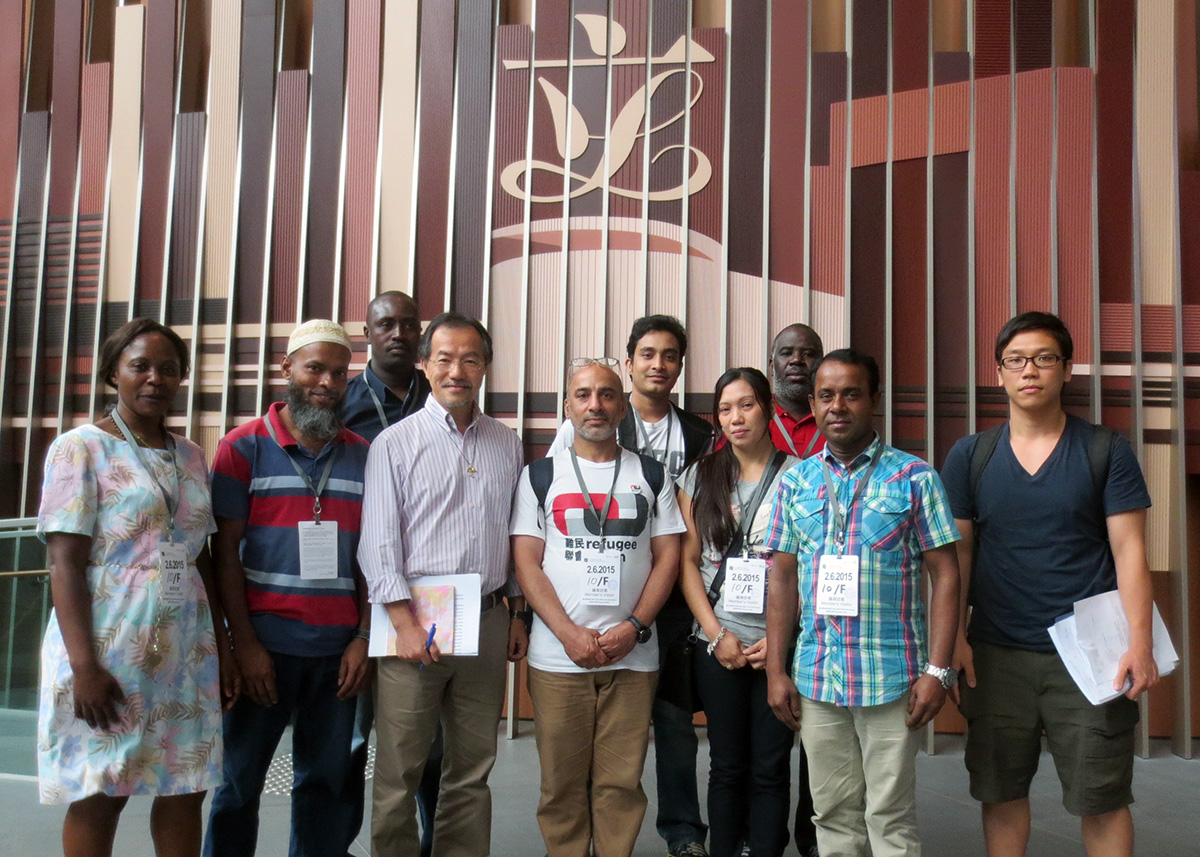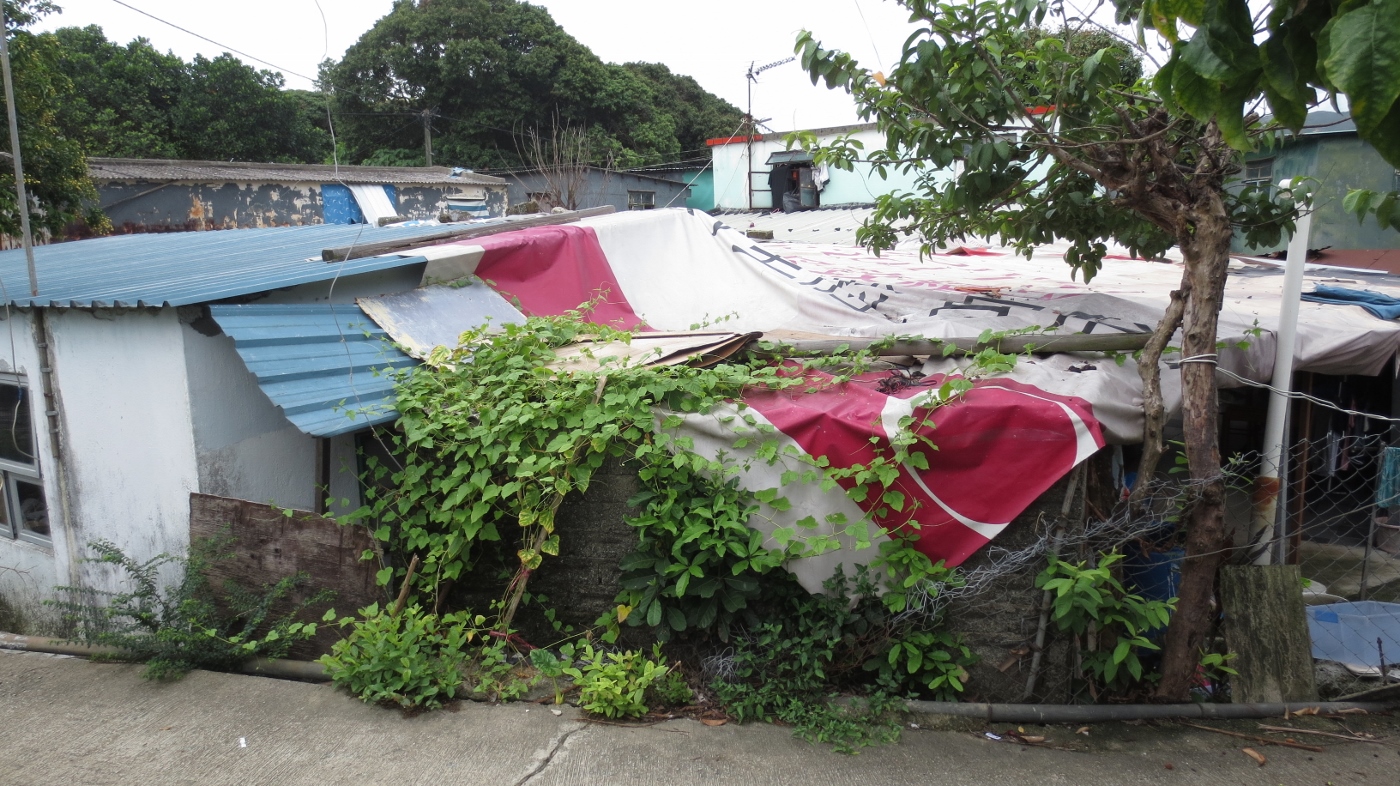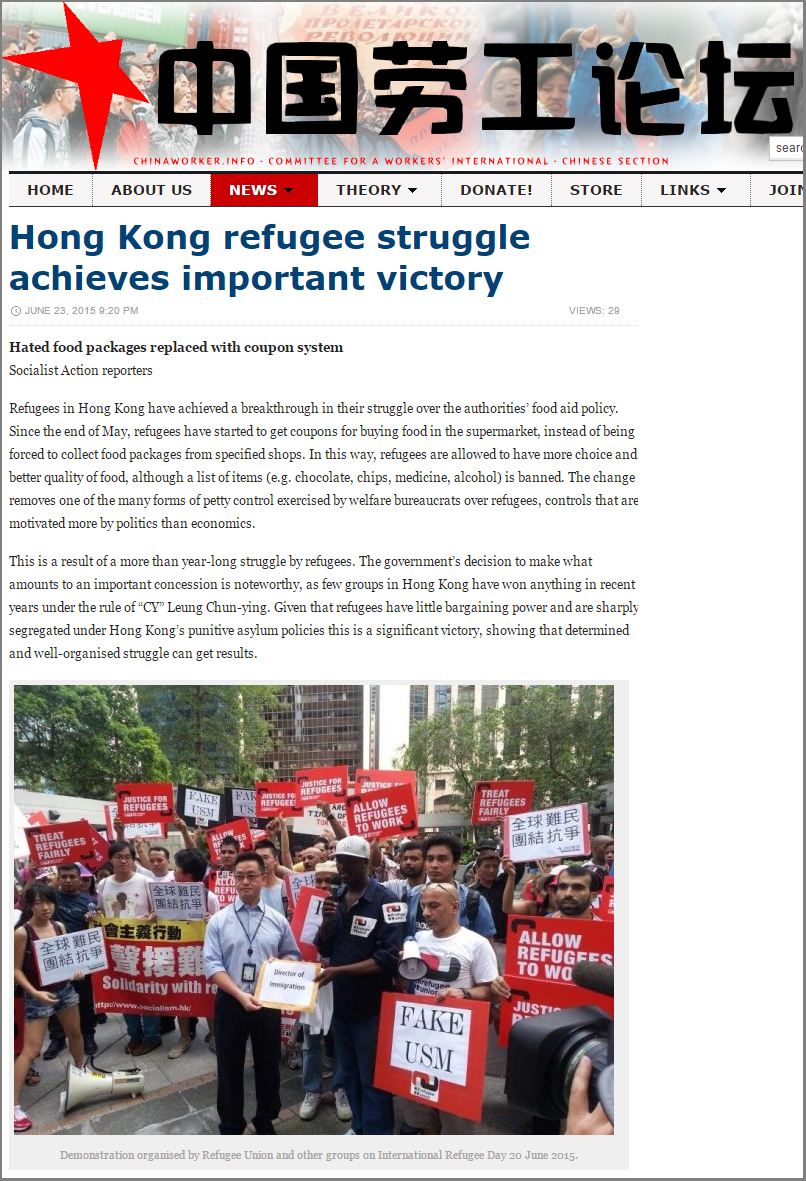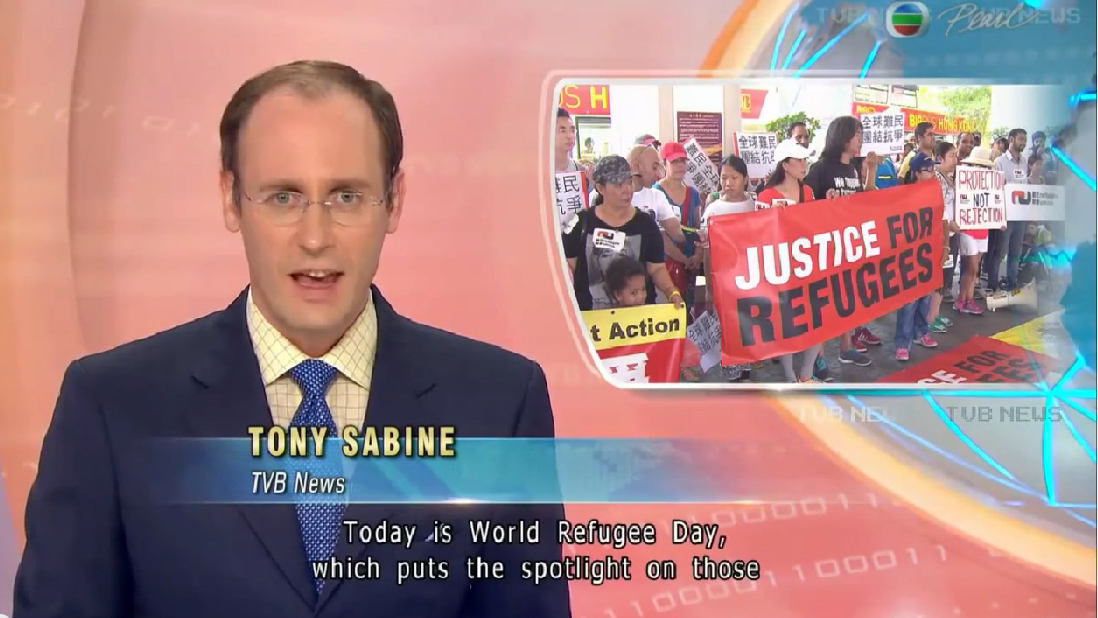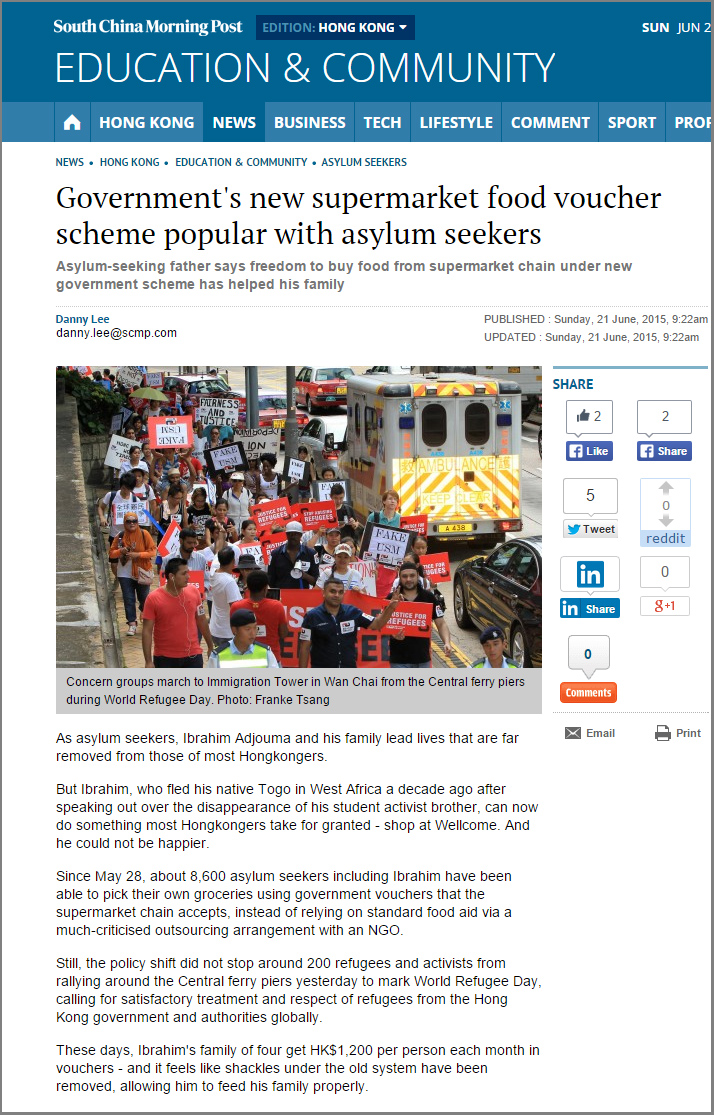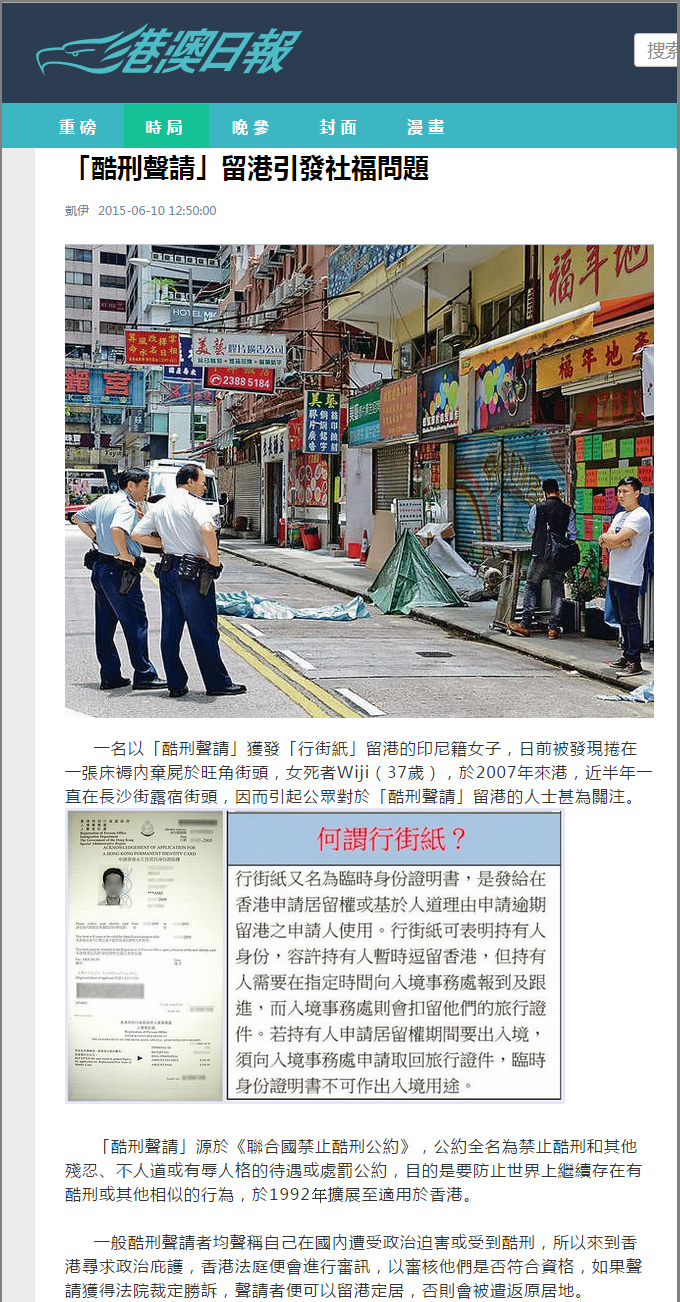Why haven’t the authorities closed down all the refugee slums?
Jun 26th, 2015 | Housing, VF Opinion, Welfare | Comment
In the New Territories, close to the MTR Light Rail station of Nai Wai, the stench of excrement emanating from a pit toilet in a crowded refugee slum we recently visited was overwhelming. A seasoned reported we accompanied was shocked by the dreadful conditions and gagged at the offensive odor. With extensive experience in India, he noted, “600 million Indians defecate in the open, but this is Hong Kong, an international financial centre, and these shelters are approved by a government contractor and rent is paid with public money, right?”
At times, the torrential rain splashed through the ventilation gaps in an unsound roof hazardously weighed down by discarded material, including several rotting mattresses. A spokesman for the 15 refugees settled in the abandoned pigsty lamented the atrocious conditions, “Where else can we live? 1500$ (in rent assistance) is not enough. My bed is wet from the rain. Last night I slept on a chair with an umbrella. We don’t have toilet … there is a dirty hole in the ground … How people say we come to Hong Kong for a better life?”
The safety, hygiene and sewerage in this slum are manifestly horrendous and a shock to the conscience of any observant visitor. Since Vision First exposed this slum in December 2013, it featured in dozens of media reports, both local and international, but the authorities have failed to close it down and relocate endangered refugees to basic, safe and clean housing.
Vision First queries whether this dump complies with the SWD Invitation to Tender that requires, “The Contractor shall ensure that Service Users … are provided with accommodation, identified … in the private sector (including electricity, water, gas supply and other basic utilities). The Contractor shall … monitor the living condition … conducting spot checks and home visits … to ensure the safety and hygiene condition of the accommodation … and shall handle emergency relocation …”
Several of the 69 refugee slums exposed by Vision First were closed in 2015. In those cases – for reasons that haven’t been made public – caseworkers informed the affected refugees that rent payments would cease from one month to another, thus abruptly terminating questionable arrangements that had previously thrived unchallenged for years. However, interestingly enough, it was not always the worst slums that closed down first. Rather, acceptable or unacceptable documentation might determine the closure or approval of refugee slums.
What leads a supposedly civilized society to abandon human beings in extreme degradation? Academics explain the marginalization and precarization of troublesome and unwanted communities. Scholars articulate the stigmatization and criminalization by the state and other dominant forces of undeserving social rejects for containment and control purposes. A USM appeal judge (name withheld) went as far as harangued a powerless refugee, “Asylum seekers are a problem for Hong Kong. Why you come here? What do you expect, a five star treatment?”
The honourable judge might agree that defecating in open sewers should not comply with acceptable standards. The refugee slums are an affront to the decency of every citizens of Hong Kong. These compounds are the shameful legacy of a failed ‘humanitarian assistance’ that a slum-dwelling refugee rightly described as “treating us like animals.”
Refugees are not unaided indigent persons compelled to find shelter wherever practical. Caseworkers visit their hovels. Housing managers approve their tenancy agreements. Hundreds of millions of dollars are channeled to landlords. Media reports expose housing failures. Lawmakers complain to Legislative Council panels. But regrettably the mockery of human dignity persists unabated.
Do these appalling living conditions and distressing human suffering evince an apparent limit to Vision First’s advocacy against refugee slums subvented by the Social Welfare Department? If so, should other sections of society also step in? It might be argued that anyone who has direct or indirect knowledge of this problem shoulders a fraction of the blame for its continuation.
Ultimately, beyond the recrimination, responsibility and social-legal implication are the men, women and children who suffer deplorable living conditions in the shadow of expensive rural villas. Nowhere else in Hong Kong does the rich-poor divide make a starker contrast! Some witnesses find it hard to sleep at night knowing that fellow human beings are crushed by extreme destitution and society is not doing anything about it.
China Daily – The long road to asylum
Jun 25th, 2015 | Housing, Immigration, Media, Welfare | Comment
The article was printed on 19 June 2015 ahead of “World Refugee Day”
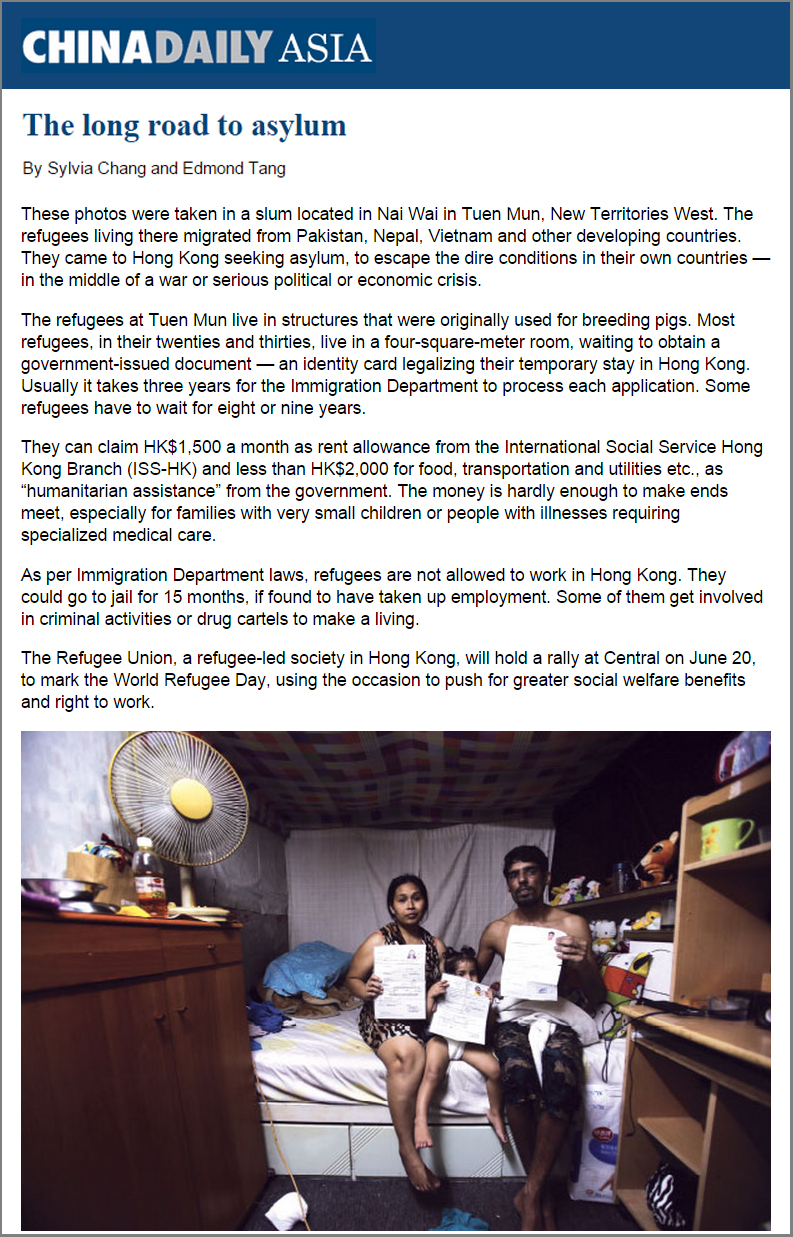
Hong Kong refugee struggle achieves important victory
Jun 24th, 2015 | Advocacy, Food, Refugee Community, Welfare | Comment
New supermarket food voucher scheme popular with asylum seekers
Jun 21st, 2015 | Advocacy, Food, Media, Personal Experiences, Welfare | Comment
Hong Kong slowly poisons and kills me
Jun 17th, 2015 | Immigration, Personal Experiences, Welfare | Comment
My name is Irfan. I came to Hong Kong from (South Asia) in February 2006 to save my life. Soon it will be 10 years and after many, many interviews the Immigration Department has never made a decision on my case: not accepted and not rejected. Why it takes so long? Is it the right way to treat refugees?
My duty lawyer said, “Your case is different. You have a very special case. Your case is genuine.” But I respectfully say, there are hundreds of refugees in Hong Kong who have real cases. Why so few win? Our life and our family’s life are wasted because we don’t have protection, we don’t have work and we don’t have normal life.
In 2007 and 2008 I had five or six interviews at Immigration office in Central. Some were from morning till night. The officers told me to wait 3 to 9 months for the decision – but nothing happened. My Torture claim was not decided and in 2009, 2010, 2011 and 2012 nobody contacted me. I waited long time – but nobody called me.
When my USM interview started in 2014, I asked, “What was the decision from 2008?” But Immigration did not reply. They said, “Your case is strong and you must give interview one more time”. Is it fair that Immigration delay the decision on my case for 10 years without making a decision?
My lawyer said that Immigration cannot refuse my case, but why it takes so long? I came to Hong Kong because I have a problem. I like to save my life. I came when I was 21 and now I am 31 and nothing changed for me here. What do I have to do for my future? They don’t allow me to work and I am scared of breaking the law. Why Hong Kong Government treat refugees like this?
One day, my Immigration officer said, “You have waited a very long time. Sorry for this!” I answered, “The time I wasted will never come back. You consider how I spend my life, how I eat, how I live and how I suffer! If you (compensate me) for what I have lost, maybe I accept your sorry! I waited too long and I need my time back. But you cannot do that. Immigration just knows how to waste refugees’ time. I came to Hong Kong in February 2006 and now my hands are empty!”
I respectfully say to the Government: just give me the HK nationality, or let me work. If I do crime, you tell police that I am trouble. I have a baby. I am very stressed about my life. I want to do suicide, but I have to think about my family. If it is not allowed to give nationality, then allow me to do work. This is not criminal. My family is suffering. I don’t have money to help them. My daughter needs to go to school. I don’t have money. My daughter need shoes. I don’t have money. My wife needs clothes. I don’t have money. My ISS-HK case officer always says “You ask your friends”.
I came here to get a new life, but Hong Kong slowly poisons and kills me. Every moment, every minute I am suffering for what my wife and my daughter need. Immigration never give me response. The welfare is not enough. I always say this, but nobody listens to me. I cannot find mattress and bed for sleeping. I asked my ISS-HK case officer to help. She said “I will call you!” Almost going to be 6 months and she didn’t call me.
Hong Kong Government cannot protect or support me. Hong Kong Immigration make me slowly die, because they don’t give me freedom. I came here because I have a problem. But they don’t respect me, so I am not free. They tell me to sit – I must sit. They tell me to stand – I must stand. They say they help me, but how they help me? They just use the law to insult me. I say to the Government: Please give me permission to do work, so I can enjoy simple life with my family.
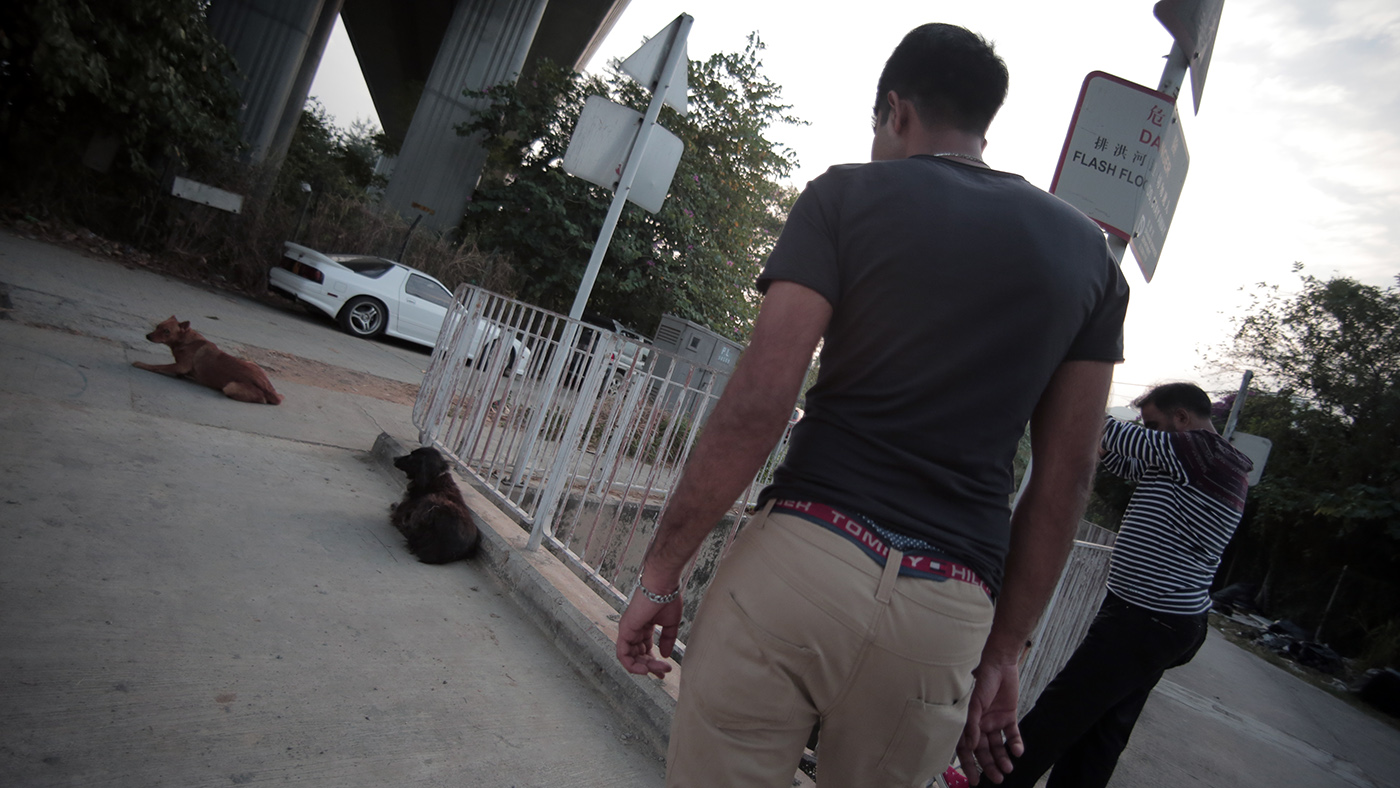
Homeless asylum seeker found dead in Hong Kong streets
Jun 11th, 2015 | Crime, Housing, VF Opinion, Welfare | Comment
An Indonesian refugee was found dead wrapped in a discarded mattress on the streets of Mongkok on 9 June 2015, reported the South China Morning Post on 8 June 2015. This tragedy highlights a general lack of protection for refugees in Hong Kong.
Homelessness is increasingly a problem faced by many asylum seekers who are not only denied sufficient welfare assistance, but are also increasingly made to wait long periods before they can access such assistance. The case of a refugee minor who was homeless for two months was reported by Vision First last week.
In April a fire broke out on a foot bridge in Sham Shui Po where many street-sleepers lived. It is reported that several dozen homeless refugees live in cardboard boxes in the area, exposed to the elements as well as to risks of fire, disease and crime. There is a troubling correlation between severe destitution and criminality – both as perpetrators and victims.
The government claims that refugees, officially branded ‘illegal immigrants’, are a problem for the security of society and therefore must be removed as soon as possible. A question should be raised: are refugees the only ones allegedly posing a threat to society? Isn’t the government endangering the life of people whose prolonged stay in Hong Kong is the responsibility of flawed border controls and a judicially bashed asylum mechanisms?
A Coroner’s Examination ought to be launched into the most recent death to ascertain why and to what effect a refugee woman, who is said to have lodged a claim in 2007, and therefore was in Hong Kong for over eight years, was apparently homeless in Mongkok.
A troubling reality might be presented before our eyes. Does the current assistance fail to offer in-kind assistance “to prevent them [refugees] from becoming destitute”?
Vision First is concerned about the generalizations made by Deputy Director of Social Welfare, Mr. Lam Ka-tai, at a Legco Panel on Welfare Services meeting, following the Hon. Elizabeth Quat’ question, “Are there any (refugee) street-sleepers?”
The Hon. Quat persisted, “Do you know if any of them are street-sleepers? Do you know?” Mr. Lam’s ensuing response came as a surprise, “As far as I know there aren’t any!”
Mr. Lam Ka-tai may perhaps want to examine the 76 article on our website relating to homeless refugees, and discover a reality he might have been concealed from him. This link is provide for his convenience: https://www.vfnow.org/?s=homeless
UPDATE:
http://www.ejinsight.com/20150609-pakistani-wanted-in-the-death-of-indonesian-woman/
http://www.thestandard.com.hk/news_detail.asp?pp_cat=11&art_id=157883&sid=44641693&con_type=1&d_str=20150611&isSearch=1&sear_year=2015
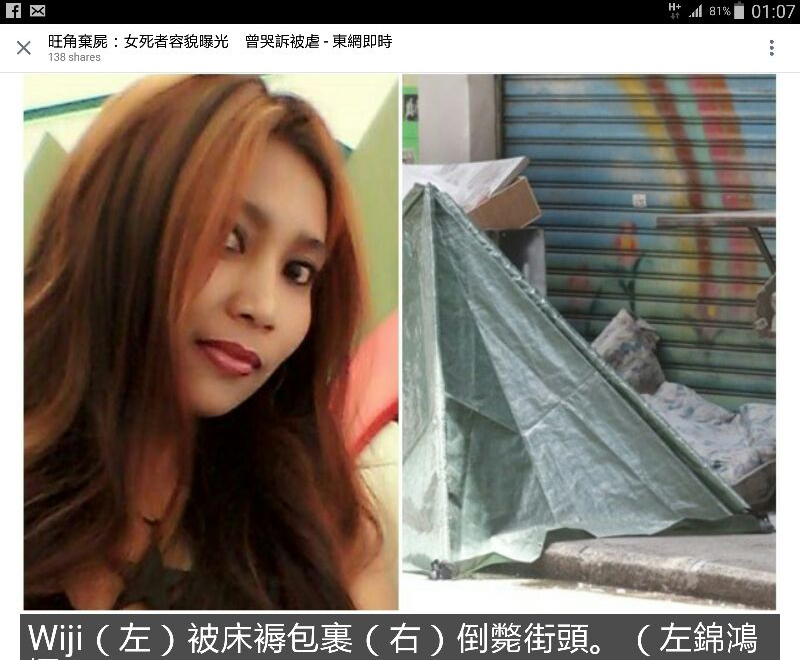
ISS-HK Notice to Service Users
Jun 10th, 2015 | Food, Housing, Welfare | Comment
Vision First welcomes the accommodation term in the below notice informing:
“Locating a suitable accommodation within the assistance level is the joint responsibility of the claimants and ISSHK and ISSHK would in general assist at most three times in the identification of available housing for each claimant unless for very special cases.” (emphasis added)
This positive development ought to require case workers to accompany refugees flat/room hunting, assisting them in securing suitable accommodation. Whether it can be achieved within the rent allowance of $1500 remains to be seen, though the experience will undoubtedly educate case workers about the difficulty of such an endeavor.
Should they face difficulties with the rent allowance, refugees are invited to lodge complaints directly with the SWD Head-office (8/F, Wu Chung House, 213 Queen’s Road East, Wanchai), as assurances have been made that rent levels may be adjusted on a case-by-case basis. In this respect, Vision First confirms that many refugees have successfully increased rent allowances by pleading their case with the SWD Head-office.
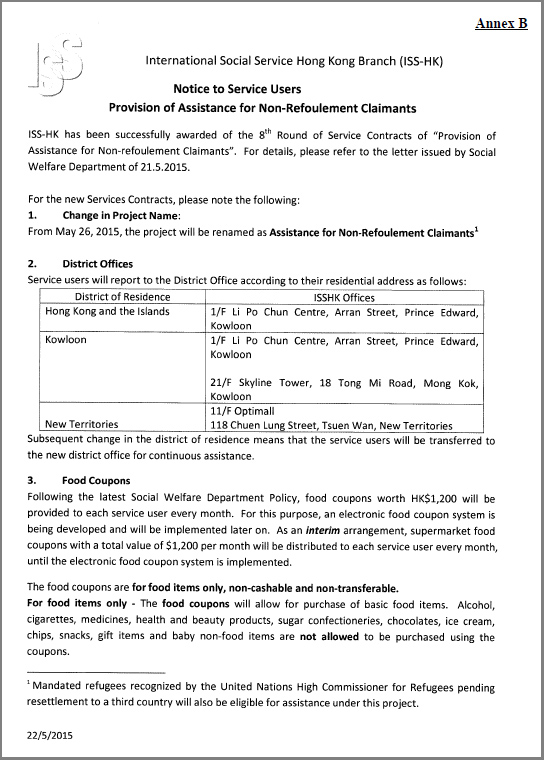
Lawmakers take government to task on inadequacy of refugee welfare
Jun 10th, 2015 | Food, Government, Housing, Welfare | Comment
A stark difference in terminology was evident at the Legislative Council meeting of the Panel on Welfare Services on 8 June 2015. On the one hand, the Security Bureau blatantly branded asylum seekers and refugees “collectively as ‘illegal immigrants’”. On the other, the welfare panel titled the session as “Issues relating to welfare of refugees, torture claimants and asylum seekers” and lawmakers used the terms refugee or claimants during the hour-long discussion,
Vision First deplores the Security Bureau’s brief that repeatedly vilifies refugees as: “foreigners who smuggled themselves into Hong Kong”, “to safeguard immigration control and for public interest, they should be removed as soon as practicable”, “the illegal immigrant status of non-refoulement claimants will not change,” and “illegal immigrants seeking non-refoulement in Hong Kong are not to be treated as ‘asylum seekers’ or ‘refugees.’”
Such rhetoric ought to be tempered by an awareness of the inalienable nature of the fundamental right to seek asylum – including in Hong Kong. In his opening remarks, Dr. Hon. Fernando Cheung Chiu-hung lamented, “Although we have not signed the UN Refugee Convention, refugees do exist … More advanced societies feel the responsibility of taking care of these refugees on humanitarian grounds. So first of all, I have to say that we should not label these people who flee their country to Hong Kong as illegal immigrants. Many of them entered our Territory through legitimate means.”
Turning to welfare issues, Dr. Fernando remarked, “Food coupons are an improvement. In the past many media organizations conducted investigations and in fact one third of funds were lost through the distribution of food at the seven food distribution outlets (appointed by ISS-HK). So food coupons are an improvement … But some refugees are prevented from purchasing (certain items). Why are they prevented? Who set the rules? … Who made the list (of allowed items)?”
The SWD responded that an electronic coupon scheme would be rolled out for purchases from other supermarkets, as well as ethnic shops selling specialty items such as Hallal food. It was further agreed that a list of banned products would be supplied so that refugees and shop attendants are informed about what is permitted and what is banned. Vision First laments that refugees were not consulted beforehand and we will lead negotiations with the SWD to optimize the food list.
The Hon. Poon Siu-ping inquired about the USM claim process, average and maximum length of asylum and locations where refugees customarily work. In this respect he inquired, “(Regarding refugees working illegally) I would like to know if this is due to insufficient welfare assistance. Has the SWD been giving extra help with their living expenses?”
Mr. Billy Woo, Principle Assistant Secretary of the Security Bureau, provided general information about 10,000 pending USM claims; Immigration will process 2000 cases in 2015; many cases of employment take place in remote recycling and auto parts yards; claimants remain in HK on average 2 to 3 years, some as long as 8 to 10 years; many overstay over 12 months before lodging a claim. The question about insufficient welfare was skillfully evaded.
The Hon. Albert Ho Chun-yan robustly criticizes current policies, “I am shocked to know that some refugees have been stuck here for almost 10 years. Even 4 years is very long! (As some are effectively stateless) we have the duty to accept them because they have been here for more than 10 years. Do they have to wait for another 10 or 15 years? … And the humanitarian assistance program is not really humanitarian enough … What can they afford with $1500 a month for accommodation? The greatest problem is they are not allowed to work … It is just like putting them in jail. Can you relax the restriction on employment?”
The Security Bureau gave a historical retrospect on court judgments emphasis that claims must be assessed according to high standards of fairness. Attentive readers might wonder whether such requirements correlate with screening results, that is, 28 successful claims out of a total of 10,000 determination in 23 years since the UN Torture Convention was extended to Hong Kong in 1992.
Mr. Woo then remarked, “If their claim is substantiated they may apply to the Director of Immigration for employment …” He was abruptly interrupted by Hon. Ho, “Yes, when their claim is substantiated, but some have been waiting for 10 years! Why can’t you allow them to take up employment with some conditions? Mr. Woo reiterated that due to immigration control and public interests, the current policy would not be changed.
Dr. Hon. Helena Wong Pik-wan put forward several requests, “Can you make a performance pledge that claims will be settled within two years of arrival? The significant criterion is how much time does have claimant have to wait … If you don’t have enough personal, you should recruit more people … This is very inhuman because (refugees) are just kept from becoming destitute, but you do not allow them to work. What can they rent for accommodation with $1500 a month? Can you tell us where the claimants live with $1500 a month? They are not allowed to work, so do they come to Hong Kong with a lot of assets? If they have no idea how long they are going to wait, shouldn’t you designate places of employment so that they can supplement their means of subsistence?”
The Security Bureau responded obliquely about the court rulings it must follow, before inviting Mr. Lam Ka-tai, Deputy Director of Social Welfare, to respond. Mr. Lam remarked, “Most of the claimants live in Kowloon and the New Territories. I have visited some who live in old building in Mongkok. Maybe 2 share a room … We encourage them to share rooms because this is not a welfare provision, but humanitarian assistance.”
Neither the Security Bureau, nor the SWD addressed the issues of insufficient rent assistance and designated work places for refugees to work legally. The Hon. Leung Che-cheung observed, “… $1200 for food does not seem to be adequate. Perhaps this is why they resort to working illegally.” Mr. Lam of the SWD responded, “… During their stay in Hong Kong, if they are unable to meet their living expenses, then on humanitarian grounds we will provide humanitarian assistance, but I emphasis this is on humanitarian grounds, it is not welfare benefits …”
The Hon. Leung Kwok-hung ‘Longhair’ enumerated current levels of assistance and remarked, “Although you say that by discretion you can approve a higher amount, basically it is not sufficient so there are only two ways to address the problem. One is to withdraw from the mechanism altogether (i.e. the UN Torture Convention) and stop claimants from coming … (the other) is to allow them to work under your supervision is better than allowing them to work anywhere. In fact (to imprison refugees for working) is more expensive than the welfare costs.” The Security Bureau reiterated it was bound by court rulings and planned to fast-track screening, but sidestepped the issue.
Dr. Hon. Kwok Ka-ki supported a performance pledge for screening before asked, “How is the $1200 amount for food set? Because $1200 a month for food really isn’t sufficient. According to media reports, ISS-HK has been receiving very bad reviews from service users, and yet the three regions of the contracts were awarded to ISS. What is the reason? Is it because you didn’t receive bids from other tenderers? Why is it that despite their poor review and feedback, you still allow the ISS to pick up the contracts?”
The SWD listed numerous food items available and remarked, “On production of a medical certificate, the SWD will decide on the case merit … if the budget of 1200$ is not sufficient. As for ISS-HK … we invited NGOs to submit bids for the service contract and ISS-HK was the only eligible bidders.” He was interrupted by Dr. Kwok, “My question is, where there other bidders?” prompting a significant clarification from Mr. Lam, “Apart from ISS-HK, we did not receive other bids”.
Vision First observes that this statement raises a thorny question: ISS-HK being a Swiss multinational, why wasn’t a single local NGO interested in providing so-called humanitarian assistance to refugees? Could it be that the levels of assistance were considered unreasonable and thus impracticable and perhaps morally reprehensible?
The Hon. Elizabeth Quat returned a leading issue of the meeting, “In relation to the accommodation, I see there is a rental allowance of $1500 per month. We are short of housing in Hong Kong. With $1500, have you considered where (refugees) are living? Are there any street-sleepers?”
The SWD responded, “They mostly live in Kowloon and the New Territories. We encourage them to share a flat, because for four persons if they share a flat they can afford a $6000 flat with two bedrooms …” The Hon. Quat interrupted, “I would like to know if the administration has the addresses of the 9000 odd claimants in Hong Kong? … Is it mandatory for the claimant to report an address to ISS?” After beating around the bush, the Security Bureau confirmed, “ISS does have the addresses.”
The Hon. Elizabeth Quat pushed on, “Perhaps a paper can be produced after the meeting. I would like to know about their state of accommodation. Do you know if any of them are street-sleepers? Do you know?” The response by Mr. Lam of the SWD came as a surprise to Vision First, “As far as I know there aren’t any! … The ISS must make an individual assessment. The ISS has to visit the accommodation and look at the conditions. They have to a thorough assessment before giving the rent allowance.” Vision First has frequently blogged about homeless refugees and brought such matters to the attention of Mr. Lam’s staff.
In the second round of questions, Dr. Fernando remarked, “When the service contract was to be awarded, one of the terms in the tender was that no single organization can get all three (service regions). Yet the SWD has failed to follow this. This is regrettable, because we have seen many problems with ISS-HK in carrying out the contract.”
Dr. Fernando took the authorities to task, “With $1500 a month it is very difficult for anyone to rent decent accommodation. If they are willing to share a flat that is better, otherwise many refugees are paying well beyond the rent allowance. I want to ask why ISS cannot sign the tenancy agreements on behalf of the refugees. In fact many refugees have to pay more than $1500 rent. I don’t think this is possible because these people are not allowed to work, they don’t have any income.”
The lawmaker was relentless, “Where can (refugees) find the money to rent bed spaces that cost over $1500? Isn’t this policy forcing refugees to do something illegal? They cannot rent a unit costing more than $1500 without an income. I would like to known the number of cases where there is over-payment of rent and why ISS can’t sign the leases. And what is the mechanism for adjusting the rent and food allowances, is it done annually?”
The SWD sidestepped the issue by remarking that many claimants had sign contracts already before they registered with ISS-HK. This is another statement Vision First will disprove with data, particularly relating to new arrivals who seek immediately assistance and to refugees who have lived in Hong Kong for over a year, the typical duration of leases for subdivided rooms.
The Deputy Director of SWD, Mr. Lam concluded with an indirect reference to the 69 refugee slums exposed by Vision First between May 2013 and November 2014, many of which have not been closed down for lack of viable alternatives within the $1500 rent allowance. Mr. Lam remarked, “The important is for the SWD or ISS to assess whether the accommodation (refugees) have sought is appropriate or not.” Vision First will continue to monitor the legality of refugee housing.
